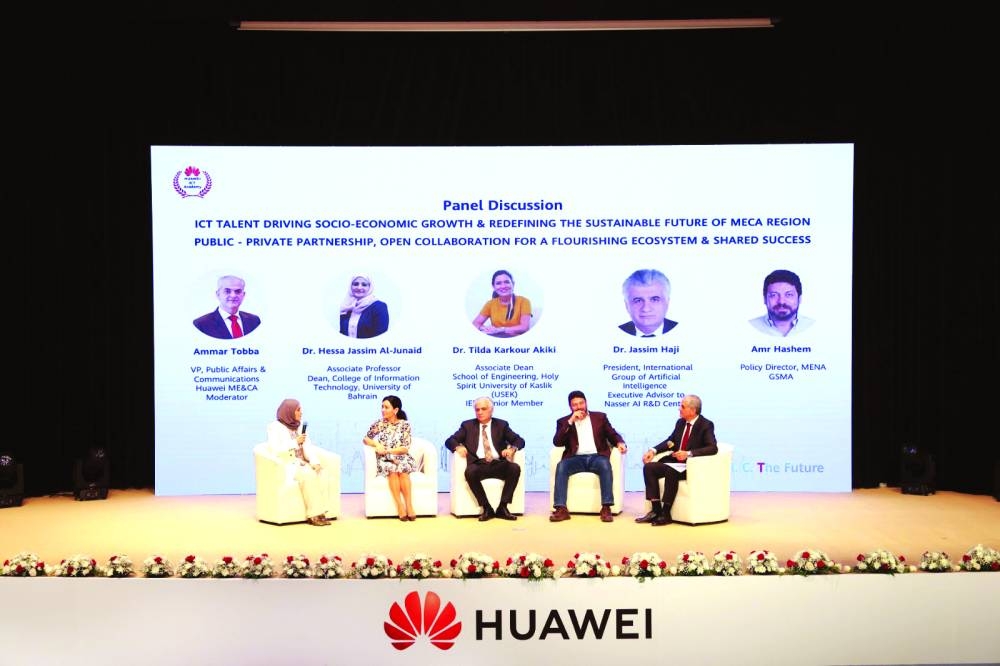On the sidelines of the Huawei ICT Competition 2023-24 regional final awards ceremony, the University of Bahrain hosted an exclusive forum on ICT talent cultivation featuring senior speakers from industry organisations and renowned regional universities.
The University of Bahrain, a partner for the Huawei ICT Competition 2023-24 regional final, hosted the official closing and awards ceremony for the programme this year. The forum panel discussion featured Dr Jassim Haji, president of the International Group of Artificial Intelligence; Dr Hessa Jassim al-Junaid, dean of the College of Information Technology, University of Bahrain; Dr Tilda Karkour Akiki, associate dean of the School of Engineering, Holy Spirit University of Kaslik, Lebanon; and Amr Hashem, policy director at GSMA MENA.
The discussion was moderated by Ammar Tobba, vice president of Public Affairs and Communications, Huawei Middle East and Central Asia Region.
The speakers discussed challenges and future opportunities in building the ICT talent ecosystem and the value of Public-Private partnerships in nurturing ICT talent innovations, supporting the university curriculum with practical skills and training, and driving the socio-economic growth of countries in the region.
Dr al-Junaid said annually, the Huawei ICT Talent competition attracts a growing number of registered students, indicating its increasing popularity.
"The College of IT students who participated in the Huawei ICT Talent competition have demonstrated high employability due to the provision of relevant skills, industry knowledge, problem-solving abilities, teamwork experience, and industry recognition. Additionally, the competition encourages students to pursue Huawei professional certifications that hold international recognition.”
Dr Haji explained how technology will impact undergraduate engineers. “AI tools are poised to transform the way talented students learn and create, offering a wealth of benefits such as guidelines to the job market, the course selection, and curriculum advisory. Furthermore, generative AI creates tests tailored to each student's learning preferences, interactive activities, or even life-like simulations.”
Dr Akiki shared her thoughts on how ICT students can contribute to today’s industrial digital transformation and the urgent need to narrow the ICT talent gap, especially to encourage more participation from women.
Hashem shared his remarks on cultivating young talent for the telecommunications industry, especially in light of the accelerated deployment of 5G. Tobba stressed that ICT talent development programmes like the Huawei ICT Competition contribute towards bridging the digital divide and narrowing the digital skills gap, nurturing young industry talents and strengthening the ICT talent ecosystem across the region."
Since its launch in 2017, Huawei's ICT Competition has become the largest and most influential initiative in the region. The competition has received support and endorsements from Unesco and more than 20 regional ministries, operators and industry partners.
This year, more than 27,500 students from over 600 universities across 21 Middle Eastern and Central Asian countries participated in the Middle East & Central Asia Huawei ICT Competition – marking the highest level of participation in the seven-year competition's history.
A total of 22 teams consisting of 66 national winners from 11 Middle Eastern & Central Asian countries, including Bahrain, Pakistan, Iraq, Saudi Arabia, Lebanon, Jordan, Kazakhstan, Qatar, Kuwait, UAE, and Oman, participated in the regional finals held in Bahrain from December 19-21.

